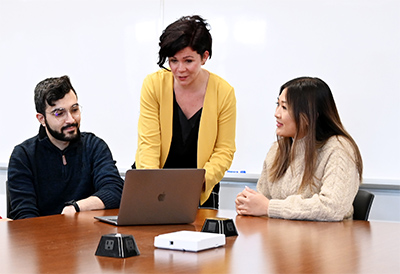Educational Excellence: SEED cultivates education innovation and capacity

“Students are at the heart of it,” said Sarah McLean, PhD’12, in sharing her vision and plans for the Schulich Education Enhancement Division (SEED).
McLean is the inaugural director of the newly established and centralized instructional design hub — a key deliverable in Schulich Medicine & Dentistry’s new five-year Strategic Plan.
An award-winning educator, McLean identified the foundational needs for SEED in 2017 while working on her master’s in education technology.
She had an idea to create a centralized resource that would support innovative curriculum approaches to develop engaging and meaningful learning environments for students. The concept began to gel after receiving student feedback and through conversations with department chairs, as well as Dr. Rich Cherry, Associate Dean, Learning with Technology & Simulation.
“Rich (Cherry) was instrumental in seeing this through,” McLean said. “He has provided strategic guidance, established the principles of a resource such as SEED and offered advice on how to be responsive to the needs of the community of educators at the School.”
Just as the planning for SEED was gaining steam, the pandemic hit.
“Suddenly everyone was stressed out and we had to quickly figure out how to deliver our programs,” said McLean.
But thanks to the depth of education expertise at the School, a transitional team of leads stepped up to develop strategies to pivot classes online. With the involvement of award-winning faculty, including Tyler Beveridge, PhD, Nicole Campbell, PhD, Anita Woods, PhD, and Drs. Chantal Forristal, Julie Kim, Sharat Pani and Trevor Thang, the plans came together quickly.
While the pandemic was disruptive, the transitional team benefited from faculty experience and expertise, providing valuable insights that are complementing SEED’s plans.
“We realized how beneficial a centralized resource focused on education enhancements is,” McLean said. “Through it, ideas could pollinate and be shared, we could spread innovation, make advancements more equitable across all our education programs and break down some of the silos at the School.”
McLean also realized the tremendous value student interns brought to this work. Along with Nicole Campbell, PhD, she supervised 30 digital media interns during the pandemic planning.
As part of its mandate, SEED continues to manage the School’s digital media intern program, working with students who offer their skills in graphic design, coding, video production and more to help faculty achieve their curriculum enhancement objectives.
 “They are the gift that keeps on giving,” said McLean of the talented group of students.
“They are the gift that keeps on giving,” said McLean of the talented group of students.
As the University shifted back to in-class learning, McLean’s pre-pandemic plans for SEED began to take shape. And with Dr. Chris Watling, Acting Vice Dean, Education Scholarship and Strategy, providing oversight and strategy development for SEED, they are beginning to make headway.
As director, McLean’s goal is to advocate for faculty support, identify and assess innovations, and create new educational opportunities for students. An instructional designer and the Information Services team are key supports in her work.
The transitional faculty team who led the School through the pandemic are continuing their involvement and working with McLean – but in the form of a community of practice – offering counsel and support on an as-needed basis.
Getting started in earnest, McLean says that they have identified a long list of needs, including instructional design expertise, new technology to create videos and high-quality software to create modules.
In the longer term, they are also looking at program evaluation, assessment and course feedback. McLean believes that there is great opportunity to do much more with the ongoing feedback from students to enact change in a timely way.
Of equal importance are the connections that SEED will be able to provide for faculty to pursue research and publish the outcomes of their work, as well as presenting at conferences.
“Not only are we creating new experiences, but we are also documenting, assessing and sharing so that we can highlight the impact of what we do,” McLean said.
With a long-standing passion for community engagement, McLean is also very enthusiastic about the opportunity for SEED to lead in the development of new programs that allow students to get hand-on experience that could complement their in-class learning and lab work, and also strengthen the University’s connection to the community.
The Medical Science Community Outreach (MaSCOt) program is one of the first new community engagement opportunities developed as part of SEED. With goals to increase access to volunteer opportunities for Bachelor of Medical Sciences students and enrich the local community, MaSCOt is partnering with local social service agencies. Established in the summer of 2021, MasCOt is creating partnerships, developing an operational infrastructure at the School and doing outreach to build awareness.
It’s still early days for SEED, but the potential for growth is great and the benefits are endless.
“We know that students thrive, grow and learn through high-impact educational experiences such as hands-on, experiential, simulation and capstone courses,” said McLean. “SEED’s mission is to build capacity to enable educators to create innovative, student-centred, experiential learning experiences — that should be the educational direction Schulich Medicine & Dentistry takes and SEED is going to be there to support every type of learning.”







